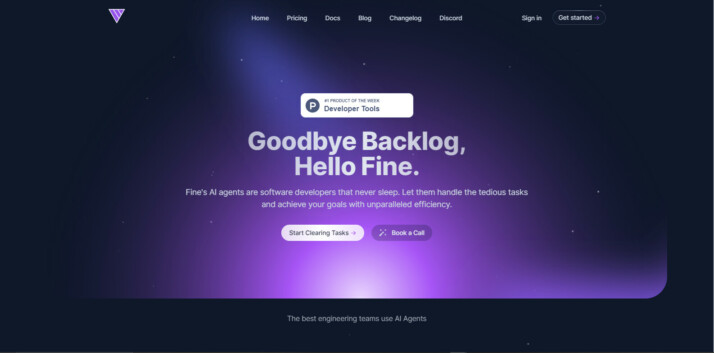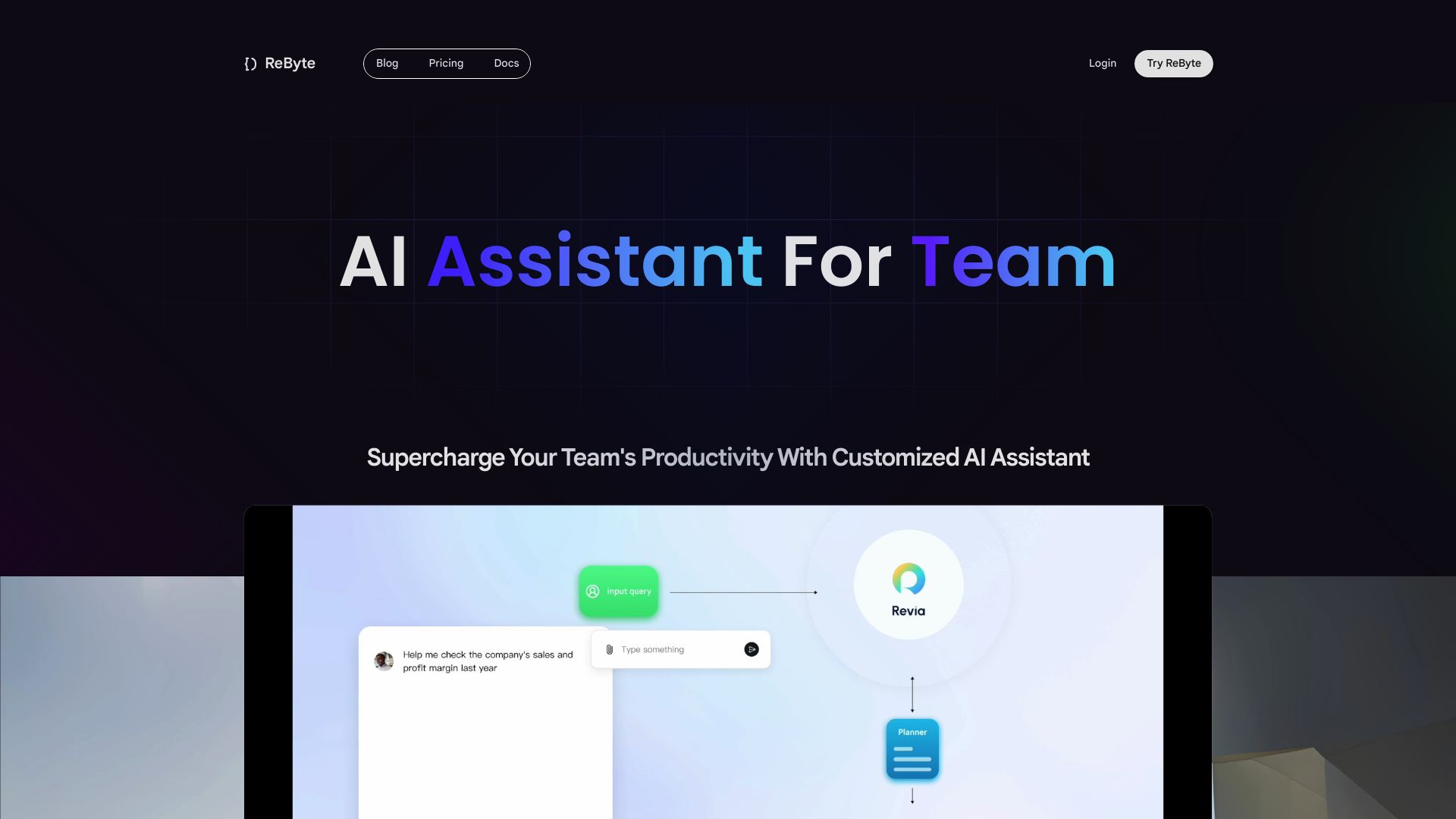Fine AI vs. Rebyte: Comparing AI Development Tools
AI-powered development tools are reshaping how software engineers and businesses create applications. Fine AI vs. Rebyte emerge as innovative platforms in this space, each offering unique approaches to AI agent development. Fine AI specializes in automating software development tasks, while Rebyte focuses on rapid AI application creation without extensive coding. This comparison explores their key features, strengths, and limitations, revealing how they stack up against the comprehensive capabilities of SmythOS. We’ll examine how these platforms address the needs of developers, business leaders, and non-technical users alike, providing insights to help you choose the right AI development solution for your projects.
Fine AI Overview
Fine AI empowers developers to create and manage specialized AI agents for automating software development tasks. This open-source platform enables teams to delegate repetitive coding work, freeing engineers to focus on complex problem-solving and innovation.
Fine AI agents excel at generating boilerplate code, running migrations, and managing APIs. They understand project specifications and codebase nuances, making coherent changes across repositories. The platform supports both development and production environments, allowing seamless progression from prototyping to deployment.


Fine AI empowers developers to create and manage specialized AI agents for automating software development tasks. This open-source platform enables teams to delegate repetitive coding work, freeing engineers to focus on complex problem-solving and innovation.
A key strength of Fine AI lies in its collaborative features. Teams can share agents, leverage interactive code previews, and work collectively on issues within shared workspaces. This fosters a culture of human-AI partnership, enhancing overall productivity and code quality. Fine AI also prioritizes transparency, retaining specifications and AI logs to provide full visibility into agent decision-making processes.
While Fine AI offers powerful automation capabilities, it lacks certain features found in more comprehensive platforms. There’s no mention of a visual builder or no-code editor, which may limit accessibility for non-technical users. Additionally, the platform doesn’t appear to support multimodal inputs or outputs, potentially constraining its versatility in handling diverse data types.
Fine AI integrates with existing developer tools and workflows, including monitoring services like Sentry for debugging. It emphasizes data privacy by keeping source code on local machines. However, the platform’s documentation doesn’t specifically address enterprise-grade features like OAuth authentication or IP control, which may be a consideration for larger organizations with strict security requirements.
Rebyte Overview
Rebyte empowers users to rapidly develop AI-powered applications without extensive coding skills. The platform’s visual agent builder enables creation of customizable AI agents with multi-step workflows using large language models. Users can construct complex backend logic and fully customized user interfaces without writing code.


Rebyte’s serverless runtime handles hosting, orchestration, testing, and deployment of AI agents. The platform integrates with private data sources and provides detailed observability into each agent step. This end-to-end solution manages the entire lifecycle of AI applications with minimal manual coding required.
Rebyte’s visual building tools, integrated runtime, and focus on enabling end-user AI development … aims to democratize AI application development for knowledge workers and teams.
The key differentiators are Rebyte’s visual building tools, integrated runtime, and focus on enabling end-user AI development. By simplifying the creation process, Rebyte aims to democratize AI application development for knowledge workers and teams. Users can translate ideas into deployed AI solutions primarily through descriptive inputs rather than programming.
While Rebyte offers powerful capabilities for rapid AI development, it may have limitations for highly specialized use cases requiring extensive customization. The platform is best suited for users seeking to quickly prototype and deploy AI applications without deep technical expertise. For complex enterprise integrations or unique AI model architectures, more advanced development platforms may be necessary.
Feature Comparison
Fine AI and Rebyte offer distinct approaches to AI agent development, with notable feature gaps in core components and security. Fine AI excels in software development automation, providing specialized agents for coding tasks like generating boilerplate code and managing APIs. Its collaborative features enable teams to share agents and work collectively on issues. Fine AI emphasizes transparency by retaining specifications and AI logs for full visibility into agent decision-making.
Rebyte, on the other hand, focuses on rapid AI application development without extensive coding skills. Its visual agent builder allows creation of customizable AI agents with multi-step workflows using large language models. Rebyte’s serverless runtime handles hosting, orchestration, testing, and deployment of AI agents. The platform integrates with private data sources and provides detailed observability into each agent step.
In terms of security, Fine AI prioritizes data privacy by keeping source code on local machines, while Rebyte’s documentation does not specifically address enterprise-grade features like OAuth authentication or IP control. Neither platform explicitly mentions features like constrained alignment or multimodal inputs, potentially limiting their versatility in handling diverse data types and ensuring ethical AI behavior.
Feature Comparison Table
| Fine AI | Rebyte | SmythOS | |
|---|---|---|---|
| CORE FEATURES | |||
| Hosted Agents (Dev, Production) | ❌ | ✅ | ✅ |
| Environments (Dev, Production) | ❌ | ✅ | ✅ |
| Visual Builder | ❌ | ✅ | ✅ |
| No-Code Options | ❌ | ✅ | ✅ |
| Autonomous Agents | ✅ | ❌ | ✅ |
| Explainability & Transparency | ❌ | ✅ | ✅ |
| Debug Tools | ❌ | ✅ | ✅ |
| Multimodal | ❌ | ❌ | ✅ |
| Multi-Agent Collaboration | ❌ | ❌ | ✅ |
| Audit Logs for Analytics | ❌ | ✅ | ✅ |
| SECURITY | |||
| Constrained Alignment | ❌ | ❌ | ✅ |
| Data Encryption | ❌ | ❌ | ✅ |
| OAuth | ❌ | ❌ | ✅ |
| IP Control | ❌ | ❌ | ✅ |
| COMPONENTS | |||
| Foundation AIs | ❌ | ✅ | ✅ |
| Huggingface AIs | ❌ | ❌ | ✅ |
| Zapier APIs | ❌ | ✅ | ✅ |
| All other APIs, RPA | ❌ | ✅ | ✅ |
| Classifiers | ❌ | ❌ | ✅ |
| Logic | ❌ | ❌ | ✅ |
| Data Lakes | ❌ | ❌ | ✅ |
| DEPLOYMENT OPTIONS (EMBODIMENTS) | |||
| Deploy as API | ❌ | ✅ | ✅ |
| Deploy as Webhook | ❌ | ❌ | ✅ |
| Staging Domains | ❌ | ❌ | ✅ |
| Production Domains | ❌ | ❌ | ✅ |
| API Authentication (OAuth + Key) | ❌ | ❌ | ✅ |
| Deploy as Site Chat | ❌ | ✅ | ✅ |
| Deploy as Scheduled Agent | ❌ | ❌ | ✅ |
| Deploy as GPT | ❌ | ✅ | ✅ |
| Scalability | ❌ | ✅ | ✅ |
| DATA LAKE SUPPORT | |||
| Hosted Vector Database | ❌ | ✅ | ✅ |
| Sitemap Crawler | ❌ | ❌ | ✅ |
| YouTube Transcript Crawler | ❌ | ❌ | ✅ |
| URL Crawler | ❌ | ❌ | ✅ |
| PDF Support | ❌ | ✅ | ✅ |
| Word File Support | ❌ | ✅ | ✅ |
| TXT File Support | ❌ | ✅ | ✅ |
Best Alternative to Fine AI and Rebyte
SmythOS emerges as the superior alternative to Fine AI and Rebyte for AI agent development and deployment. Our platform combines powerful features with unmatched ease of use, enabling rapid creation of sophisticated AI solutions for any use case.
We offer a comprehensive visual builder that surpasses both Fine AI and Rebyte in functionality. Our drag-and-drop interface allows users to construct complex AI workflows without coding, democratizing AI development for technical and non-technical users alike. This visual approach accelerates development compared to Fine AI’s code-centric model, while providing greater customization than Rebyte’s limited no-code options.
SmythOS emerges as the superior alternative to Fine AI and Rebyte for AI agent development and deployment. Our platform combines powerful features with unmatched ease of use, enabling rapid creation of sophisticated AI solutions for any use case.
SmythOS delivers enterprise-grade security lacking in Fine AI and Rebyte. We implement robust data encryption, OAuth authentication, and IP controls to keep your AI agents and data protected. Our constrained alignment capabilities ensure AI behavior aligns with organizational goals and ethics — a critical consideration absent from competing platforms.
Unlike Fine AI’s narrow focus on software development or Rebyte’s generalized approach, SmythOS supports unlimited use cases through extensive integrations and deployment options. We connect to APIs, data sources, and AI models from leading providers. Agents can be deployed as APIs, chat interfaces, scheduled tasks, and more. This flexibility empowers users to implement AI across their entire tech stack and business processes.
SmythOS stands out with advanced features missing from competitors. Our platform enables multi-agent collaboration, allowing teams of AI agents to tackle complex problems. We provide hosted vector databases for efficient data processing at scale. Unique capabilities like our sitemap crawler and YouTube transcript analyzer expand the possibilities for ingesting and leveraging data. With SmythOS, the potential applications for AI in your organization are limitless.
Conclusion
Fine AI and Rebyte offer compelling solutions for AI agent development, each with unique strengths. Fine AI excels in software development automation, providing specialized agents for coding tasks and fostering team collaboration. Rebyte focuses on rapid AI application development without extensive coding skills, featuring a visual agent builder and serverless runtime.
However, SmythOS emerges as the superior choice, offering a comprehensive platform that combines the best of both worlds and extends beyond their capabilities. Our drag-and-drop interface surpasses Rebyte’s visual builder, allowing users to create complex AI workflows effortlessly. Unlike Fine AI’s focus on software development, SmythOS supports a broader range of applications across various industries.
SmythOS stands out with its extensive integration ecosystem, supporting over 300,000 integrations and a wide array of AI models. This versatility, combined with our multi-agent orchestration and versatile deployment options, provides unparalleled flexibility and scalability. Our platform also prioritizes security and transparency, addressing enterprise-grade concerns that may be lacking in Fine AI and Rebyte.
To experience the power of SmythOS firsthand, we invite you to create a free SmythOS account. Start building AI agents without any time limit or risk, and see how our platform can revolutionize your workflow. For those seeking inspiration, explore our diverse range of AI-powered agent templates to jumpstart your projects. Don’t miss the opportunity to unleash your AI agents and deploy them anywhere with our versatile deployment options. Join us in shaping the future of AI-driven automation and innovation with SmythOS.
Last updated:
Disclaimer: The information presented in this article is for general informational purposes only and is provided as is. While we strive to keep the content up-to-date and accurate, we make no representations or warranties of any kind, express or implied, about the completeness, accuracy, reliability, suitability, or availability of the information contained in this article.
Any reliance you place on such information is strictly at your own risk. We reserve the right to make additions, deletions, or modifications to the contents of this article at any time without prior notice.
In no event will we be liable for any loss or damage including without limitation, indirect or consequential loss or damage, or any loss or damage whatsoever arising from loss of data, profits, or any other loss not specified herein arising out of, or in connection with, the use of this article.
Despite our best efforts, this article may contain oversights, errors, or omissions. If you notice any inaccuracies or have concerns about the content, please report them through our content feedback form. Your input helps us maintain the quality and reliability of our information.
